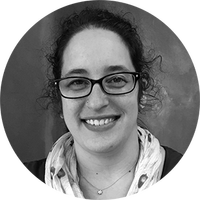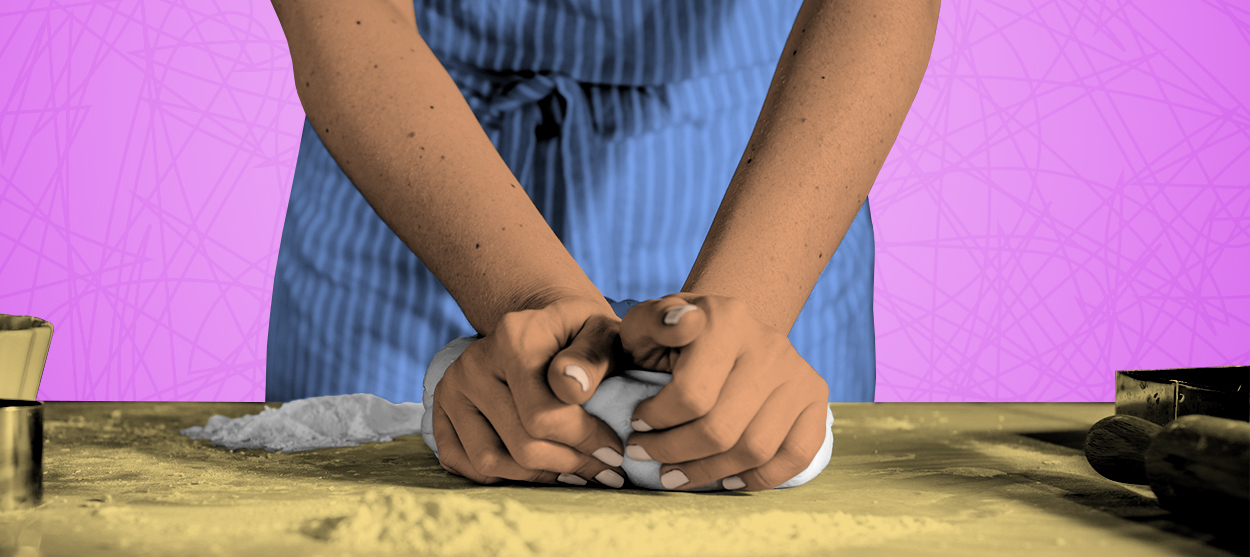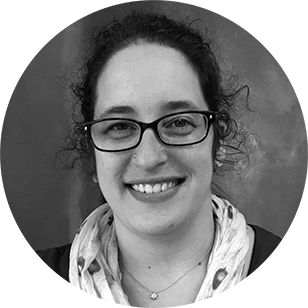The primal comfort of domestic arts
Why things like baking and sewing help us feel better during times of crisis


A free daily email with the biggest news stories of the day – and the best features from TheWeek.com
You are now subscribed
Your newsletter sign-up was successful
I'd been meaning to try baking sourdough bread for years. All it took was a global pandemic to get me to start. In the nearly two months since the Bay Area ordered its residents indoors for our neighbors' safety, I've managed to coax a colony of living critters from a simple slurry of flour and water. Now, every weekend, I pull out my kitchen scale and my jar of bubbly sludge, slip an apron — tailor-made by me, for me — over my head, and set about baking a loaf of crusty bread.
As COVID-19 ravages communities across the U.S., and our executive branch stokes the flames of the pandemic to fuel its own interests, I'm taking comfort in the domestic arts. And I'm not alone. A lot of virtual ink has been spilled about the sudden domestication of the American white-collar worker. In my own social sphere, nearly everyone is cooking and crafting as if our lives depended on it. (Which, in a certain sense, they do.)
For me, this is familiar territory. It's been less than a year since I was last here, cooking and sewing my way through uncertainty and grief. So when I see my friends and colleagues sharing photos of layer cakes and knitted shawls, I hum with recognition. This is primal stuff.
The Week
Escape your echo chamber. Get the facts behind the news, plus analysis from multiple perspectives.

Sign up for The Week's Free Newsletters
From our morning news briefing to a weekly Good News Newsletter, get the best of The Week delivered directly to your inbox.
From our morning news briefing to a weekly Good News Newsletter, get the best of The Week delivered directly to your inbox.
For the first half of 2019, I helped care for my father through the end stages of a terminal illness. He spent his final months in and out of the hospital, wracked by one unexpected complication after another. In mid-April he had a hemorrhage and was rushed to the emergency room; we didn't know whether he would survive the night. The surgical team worked until deep into the wee hours of the morning to stop the bleeding and save his life. But as we sat around his ICU bed the next day, it was clear to us that he was living on borrowed time.
I came home from the hospital that afternoon feeling wrung-out and heavy, bubbling dully with emotions I couldn't digest. My new sewing machine — a gift from my grandmother — sat unused on a table in the corner. My cat had taken to climbing on top of it and chewing the spindles. I looked at the teeth marks in the white plastic and thought, "This machine needs a cover." So I pulled up a YouTube tutorial, grabbed some fabric and thread, and started sewing. I didn't stop for the better part of a year.
As my father declined, I threw myself into domestic creativity. I sewed aprons and wore them while batch-cooking heat-and-eat meals for my mother and me. When I'd made more aprons than I could reasonably wear myself, I started giving them away to family and friends. My parents' 30-year-old potholders wore out, so I made new ones. I sewed tote bags and brought them to the store three at a time, the better to carry all of the produce and meat I was suddenly cooking with, all the flour and butter I was quickly going through. After my father died, I taught myself how to piece quilt blocks, and made three quilt tops in the space of a summer.
It was a kind of frenzy I'd never experienced before, and I've thought a lot about what made it so intense. Part of it was necessity, perceived or actual: My sewing machine needed a cover, so I made one. I sewed aprons because I needed new aprons. I made sturdy, machine-washable tote bags to replace the flimsy freebie ones we'd accumulated over the years. I cooked because, well, my family and I needed to eat.
A free daily email with the biggest news stories of the day – and the best features from TheWeek.com
It was also about entertainment, or distraction, or both. For months on end, I spent almost all of my time either caretaking at my parents' house or recuperating at home. I needed ways to occupy my brain and my hands, so that the lapping waves of rage and sadness around my edges didn't roar in and drown me. And I needed creative outlets: I wasn't writing, because everything I wanted to write felt too raw and uncertain to put into words, so I channeled that energy into vegetables and quilting cotton instead.
It's not an accident that my creativity ran to "women's work" — activities that are deeply bound up with caring for others. Whatever reservations I have about this, I'd be lying if I said I didn't get something out of indulging the impulse to nurture. Nursing my father did not come naturally to me; I'm distractible, impatient, and squeamish. I often left my caregiving shifts feeling like a failure. By spending hours in the kitchen or at my sewing machine, I could convince myself that the domestic skills I'd been honing since childhood hadn't deserted me entirely.
In a devastating and destabilizing time, making food and household goods felt concrete and achievable. I couldn't make my father healthy again, or protect him from suffering, or heal the pain and grief radiating from my loved ones. But I could make an apron that would protect my clothing from stains, or a tote bag that could carry a week's worth of groceries, or a nourishing lunch that used up leftovers from the fridge and also tasted pretty good. I could do these things, these creative and ordinary things, and have the results to hold in my hands afterward. I could use what I produced to help care for those around me, even as I knew that none of us would be whole again for a long time.
Throughout my father's final illness, and as I grieved for him after he died, making things with my hands anchored me. And now that a new wave of grief is breaking — this time, over our entire country — I find myself returning to the act of domestic creation. I tend diligently to my sourdough starter, and am teaching myself what a perfect bread dough feels like under my fingers. I've started experimenting with sewing my own clothes — a pinafore, a circle skirt, a pair of summer shorts. I even made myself a new apron last week, just because I could.
It's nowhere near enough to quench my fury and despair at the powers that be. It won't bring back the lives needlessly lost to COVID-19. But it's helping me, and so many people I know, keep moving forward as the ground ripples and roils beneath our feet.
Want more essential commentary and analysis like this delivered straight to your inbox? Sign up for The Week's "Today's best articles" newsletter here.
Zoe Fenson is a freelance writer based in the San Francisco Bay Area. Her writing has appeared in Longreads, Narratively, The New Republic, and elsewhere. When she's not writing, you'll find her doing crossword puzzles in cocktail bars or playing fetch with her cat.
-
 The Week Unwrapped: Do the Freemasons have too much sway in the police force?
The Week Unwrapped: Do the Freemasons have too much sway in the police force?Podcast Plus, what does the growing popularity of prediction markets mean for the future? And why are UK film and TV workers struggling?
-
 Properties of the week: pretty thatched cottages
Properties of the week: pretty thatched cottagesThe Week Recommends Featuring homes in West Sussex, Dorset and Suffolk
-
 The week’s best photos
The week’s best photosIn Pictures An explosive meal, a carnival of joy, and more
